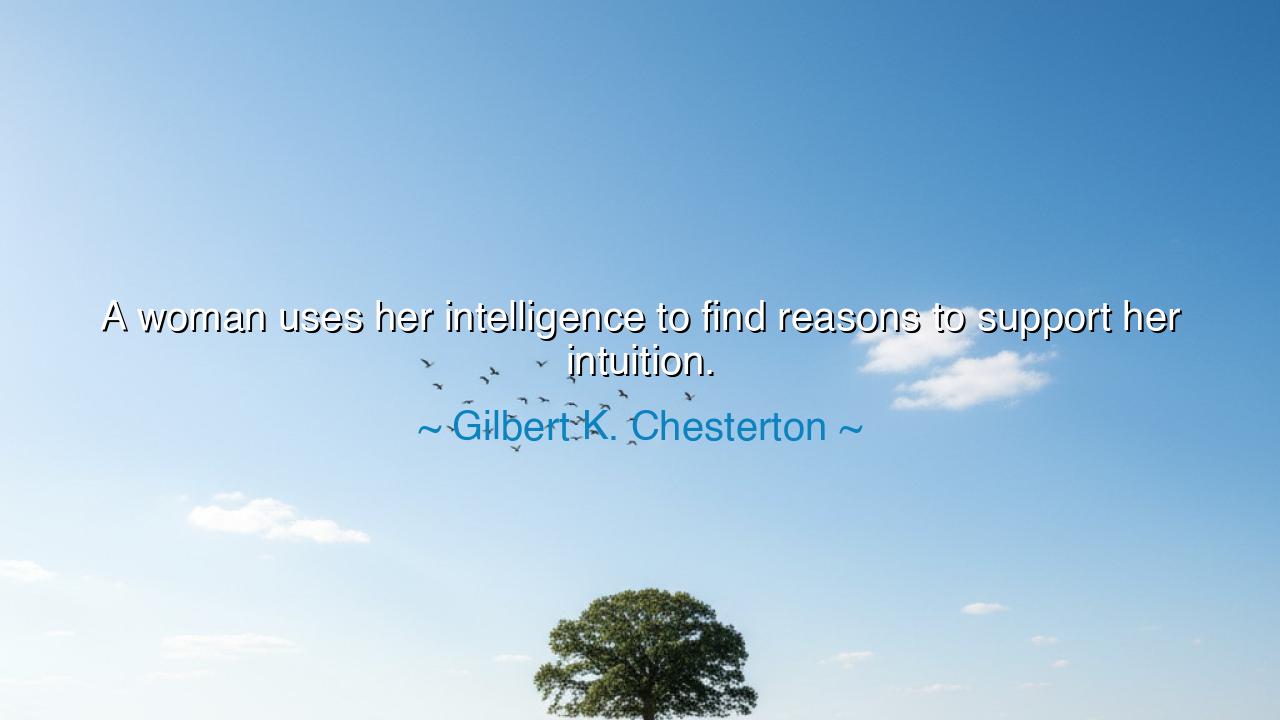
A woman uses her intelligence to find reasons to support her






“A woman uses her intelligence to find reasons to support her intuition.” — so wrote Gilbert K. Chesterton, the philosopher of paradox, the poet of reason who found the divine in laughter and contradiction. In this line, he does not mock the feminine mind, as some have too hastily claimed, but celebrates its mysterious harmony — the union of intellect and instinct, of logic and feeling. For Chesterton, who saw the world as a dance between opposites — faith and doubt, light and shadow, wisdom and wonder — woman represented not weakness, but wholeness. Her intuition, that deep and wordless knowing that rises from the heart, was not opposed to intelligence but illuminated by it. The mind may argue, but the soul knows, and woman, in Chesterton’s eyes, is often the one who unites the two.
The origin of this quote lies in Chesterton’s reflections on the nature of reason and intuition — themes he returned to often in his essays and books, especially What’s Wrong with the World (1910). He saw in the modern age a kind of cold rationalism, a pride in intellect that denied the mystery of life. Against this, he set the image of the intuitive heart, which he believed women possessed in fuller measure. Yet, Chesterton did not mean that women were unthinking; rather, he saw them as thinkers of a different order — guided not only by logic, but by love, empathy, and moral perception. Where men often reason their way into doubt, women, he said, reason their way toward conviction. They do not discard their instincts; they defend them.
To understand his meaning, one must see intuition as the wisdom of the soul — the inner compass that perceives truth before the mind can name it. It is the quiet voice that whispers beneath reason, often drowned out by the noise of argument. Intelligence, on the other hand, is the craft of giving form to that truth — of explaining, refining, and defending what the heart already knows. When Chesterton says that a woman uses her intelligence to find reasons for her intuition, he means that she does not abandon logic; she bends it toward faith in what she feels to be right. Hers is a wisdom that does not separate knowing from caring, nor thinking from believing.
Consider the story of Florence Nightingale, the founder of modern nursing. When she declared that cleanliness, light, and compassion could save the wounded, the male physicians of her day dismissed her as sentimental. Yet her intuition — her deep, instinctive sense that healing required both science and tenderness — proved true. She used her intelligence not to doubt her instincts, but to prove them, gathering statistics, organizing hospitals, and writing reports that transformed medicine. Her heart saw what reason missed; her mind gave reason form. This is Chesterton’s wisdom in living color — the union of intellect and intuition in the service of truth.
There is also in this quote a lesson for all souls, whether man or woman. For what Chesterton praises in womanhood — the blending of thought and feeling — is what humanity as a whole must learn. We have made a god of intellect, forgetting that reason alone cannot create meaning. It can build machines, but not morals; it can measure the stars, but not the worth of love. Intuition, that ancient light within, gives direction to the cleverness of mind. The true sage, like the true artist, like the true woman in Chesterton’s vision, uses reason not to destroy mystery, but to honor it.
Yet Chesterton’s insight also holds a gentle irony. For in saying that women use their intelligence to justify their intuition, he reminds us that belief often precedes argument. Even the greatest philosophers begin not with proof, but with conviction — a faith in something unseen. The scientist believes in order before he measures it; the poet believes in beauty before he writes it; the saint believes in goodness before he lives it. The mind seeks reasons, but the heart points the way. Woman, as Chesterton saw her, is simply more honest about this truth. She does not pretend to discover what she has already known in her soul.
So, my listener, take this lesson and hold it close: trust the harmony between heart and mind. Let your intuition speak — that quiet, inner certainty that knows when something is right, even when reason hesitates. Then, use your intelligence to give it form, to bring it into the world where it may be tested, refined, and shared. Do not separate the two; let them walk together, as faith walks with understanding.
For in the end, Chesterton’s wisdom is not about gender, but about balance. The world is whole only when reason serves love, and intellect serves truth. To live rightly is to unite both the clarity of thought and the purity of feeling — to dream with the heart, and to build with the mind. And when you do so, your life itself becomes an act of genius — the art of turning what is felt into what is known, and what is known into what is good.






AAdministratorAdministrator
Welcome, honored guests. Please leave a comment, we will respond soon